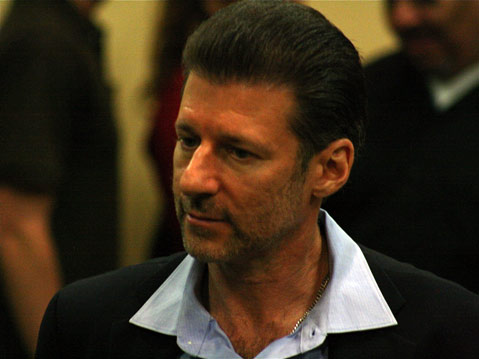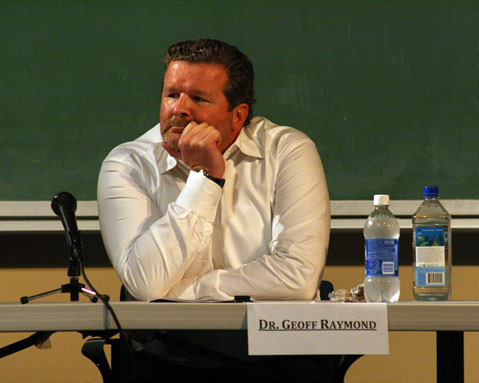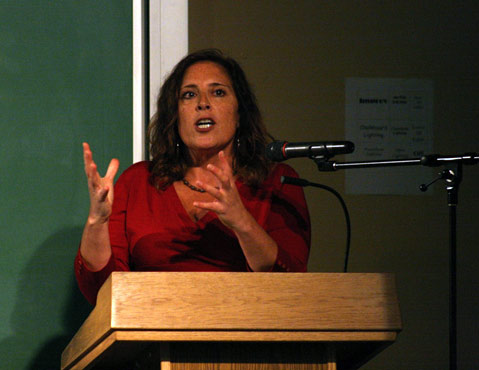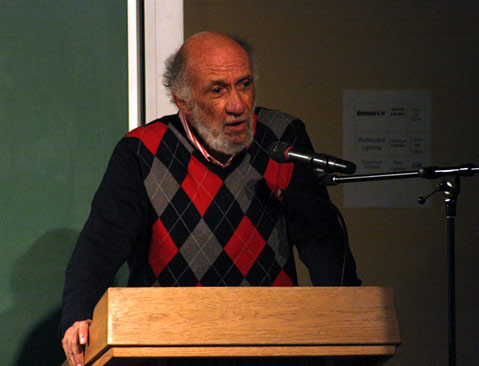Panel Defends Robinson
Committee to Defend Academic Freedom Hosts Public Panel of Professors

The ongoing saga of UCSB sociology professor William Robinson and his now-infamous email continued last night during a dramatic panel held at Embarcadero Hall in Isla Vista. Four panelists universally defended Robinson and his decision to circulate a blog posting that juxtaposed images of Jews from the Holocaust with images of Palestinians in the Gaza Strip among students within his Sociology of Globalization class. The professor is being investigated for charges of academic misconduct by UCSB’s Academic Senate after two of his students filed a complaint about the email in January. The case has subsequently garnered worldwide attention. Although Robinson was present at Thursday evening’s event, he did not address the crowd.

The event, attended by more than 200 students, faculty, and interested area residents, was hosted by the Committee to Defend Academic Freedom that was founded in the immediate wake of the misconduct accusations lobbed at Robinson. The non-funded group’s stance, as stated in a brief welcoming address, centers around what they feel is a mishandling of the Robinson case. According to the committee, the volunteer members believe it is their responsibility to fairly and accurately disseminate relevant information to counter alleged attempts by the university and Robinson’s accusers to keep the reprisal processes behind closed doors.
Unsurprisingly, the sensitive nature of the incident and the subsequent university-based case against Robinson elicited strong emotions from both sides throughout the night’s proceedings. Although there was not much opportunity for open debate, tempers and voices gained heat and momentum as the night went on – there was no shortage of “harrumphs,” “guffaws,” and unbridled outbursts. The majority of the audience appeared to support Robinson, yet the contingent of those opposed to the sociology professor’s teaching tactics certainly made their presence known by consistently interrupting the proceedings with fervent interjections. The most frenzied drama occurred toward the end of the evening during the question and answer session, as impassioned audience members addressed the panel and crowd.

The first panelist to speak, UCSB associate professor of sociology Geoffrey Raymond, began by explaining his relevance to the case. His position within the school’s Academic Senate and his place as director of undergraduate studies for the sociology department, he said, have directly involved him in all elements of the unfolding situation. According to Raymond, the complaints and academic handlings of the Robinson case have been dealt with so poorly that he did not have time to address each transgression; Raymond stated that he felt the entire process should simply begin anew. In a loud, assertive tone, he attacked the lack of appropriateness and professionalism that he feels occurred throughout procedures, stating that people tend to adhere to the idea that “if a process has begun, we just follow the process.” Instead, Raymond boldly asserted that the university needs to first “give us a process we can trust.”
Raymond’s main issue with the events that have unfolded thus far centered around the fact that the accusing students, instead of speaking with Robinson first, acted “in the most aggressive way possible” by immediately bringing their complaints to the school’s charges officer (who allegedly failed to even attempt to resolve the issue informally before it went to the Academic Senate) and preemptively contacting Los Angeles’s Simon Wiesenthal Center as well as the Anti Defamation League (ADL). In short, Raymond expressed that he felt things went too far too quickly before Robinson even had a chance to react. “By defending Professor Robinson we are defending ourselves,” he said.
Plus, Raymond went on, Robinson was clearly left out of the loop every step of the way and was not given any opportunity to defend himself or his motives for sending the email. Although one of the students who filed the complaint said in her letter to the Academic Senate that she had contacted Robinson regarding the email, he has said that he was not even aware of the students’ complaints until the grievances were formally presented to him by the senate. Raymond described Robinson’s unwitting involvement in the controversy as a “Kafkaesque process for the accused.” Even more disturbing, Raymond continued, was that the university spokesperson appeared “more informed every step of the way,” meaning Robinson often learned of his case’s progression through public media outlets rather than private briefings.

Professor Lisa Hajjar, although eventually defending Robinson and what she said was his earned, unequivocal right to academic freedom, began by stating that she herself would not have sent the email. “You don’t invoke Nazis unless you’re talking about Nazis,” she said. Nevertheless, Hajjar went on, Robinson was well within his professional and legal rights when he forwarded the blog posting of Nazi and Israeli war photographs. Hajjar walked the audience through the history of academic freedom, beginning with the 1915 summit of university professors who established the core principals of the concept. Before that, she asserted, professors were analogous to employees in a factory in that they could be fired at will without explanation.
The idea of academic freedom, Hajjar continued, allows professors to serve larger social goals and purposes – with the protection of the academic freedom tenets, Hajjar claimed, teachers are able to effectively promote inquiry in students and serve the general public as “professional intellectuals.” Although their choices of course materials may not be universally agreed upon, said Hajjar, it is a professor’s right and at times responsibility to facilitate learning through disagreement and debate. “You don’t go to the gym to relax,” Hajjar said, “and you don’t attend a university to be comfortable.” By challenging and testing a student’s ideas, she asserted, a professor is providing a service of scholarly stimulus and exploration.

Professor Richard Falk, a professor of international law at Princeton University for 40 years and a panelist on Thursday who has found himself embroiled in controversy, agreed with Raymond that “the case spiraled out of control. When controversial subject matter emerges,” said Falk, “it agitates contentious elements.” The seasoned professor and UN Human Rights Council member stated that “what we need from education is active and engaged citizens, not passive subjects.” Like Hajjar, Falk took no issue with providing divisive materials to students in the name of open discussion and debate. In support of Robinson’s actions, Falk went on to condemn UCSB’s handling of the matter and stated it was a failure on the part of the institution to protect and insulate a faculty member from over-dramatic, public accusations.
Falk also spoke on the hot-button nature of the Israel-Palestine conflict, saying that the very essence of the controversy makes balance of understanding difficult. However, he went on, “students have a responsibility to engage issues.” The very notion of anti-Semitism, Falk said, “is diluted and used as a shield to legitimate criticism of Israel.” This phenomenon has played a role in accusations against Robinson, he said, continuing that Robinson has received an undeserved penalty for innocuous actions. “Even if there’s full exoneration, he will be forever associated with this issue.” This, Falk said, is completely unacceptable and every step should be taken to avoid this kind of unwarranted backlash in the future. He concluded by asserting that “our own future rests on how this case is handled.”
After a brief speech by Professor Harold Marcuse who similarly defended Robinson’s teaching tactics, the audience was permitted to ask the panel questions. What was meant to proceed as a back-and-forth, question-and-answer segment quickly unraveled into an opportunity for audience members to present their own ideas and agendas. Although many of the comments were articulate and reasonable, some remarks entered the realm of absurdity and prompted disapproval from the crowd.
One audience member accused Robinson of intentionally drawing international attention to himself, claiming that it was the professor’s motive all along to become the center of the current controversy. In a particularly dramatic moment, a female audience member, who spoke at length about the inappropriateness of Robinson’s email, citing her Holocaust-surviving grandparents, was eventually cut off by the microphone moderator as she went well over the two-minute allotted time per “question.” After insisting that she be heard, and after she was subsequently refused any more time, she began shouting, “Because I’m Jewish you’re going to stifle me?!” The woman was eventually escorted out but not before verbally attacking the panel and audience for prejudiced and biased practices.
In another poignant and somewhat unnerving moment, an audience member who identified himself as Walter Kohn, a retired UCSB physics and chemistry professor and the university’s first Nobel Laureate, accused the panel of being underrepresented and not “adequately expressing a variety of viewpoints.” After speaking at length (again, well over the two-minute limit), Kohn was cut off by the moderator. Immediately, many audience members began shouting disapproval including the repeated quotes, “Respect your elders!” and “Let him speak!” Additionally, one student expressed his opinion that many of his peers are afraid to speak up about personal grievances, and that that was the reason Robinson was not directly confronted in the first place. Professor Raymond responded that he could not agree or sympathize with the statement, as the students who brought their cases against Robinson, he said, used “YouTube as a soapbox” to publicly voice their complaints.



